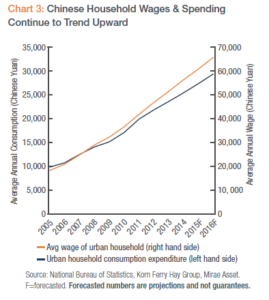November 1, 2016. By Mark Barry:
Our Global Spotlight series takes a dive into foreign economies and their big-picture impacts. This edition will include commentary and analysis covering the economic state of China, and has been posted in three issues: The Great Rebalance (10/25/16), Economic Transition and Reform (10/27/16), and this final segment, Risk of the Consumer. To download the complete series, click here: Global Spotlight: China
Rise of the Consumer
We have previously noted that The transformation of the Chinese economy is a huge task, and the path it takes along this transformation will impact both global economic growth and financial markets. Ultimately, China must strike the right balance; not rebalancing too quickly which would result in a hard landing, nor delaying reforms that if not undertaken would stunt future growth. This change in consumption patterns is already well underway, and has encouraged innovation and growth in the private sector to meet consumer demands. This is particularly evident within the information technology industry, which has seen companies such as Alibaba and JD.com in e-commerce, Tencent in social media, and search giant Baidu all become leading global businesses. China’s e-commerce sector is now the largest in the world, having been helped by the population’s high rate of technology adoption and rapidly expanding use of mobile devices. To put the size and scale of some of these companies in to perspective, consider this statistic from 2014: on “Cyber Monday” Amazon had 36.8 million orders totaling $2.7 billion in sales, on “Singles Day,” the Chinese equivalent, Alibaba has 278 million orders totaling $9.3 billion in sales![2]Understanding that China faces a difficult path moving forward, let’s take a look at some positive developments within the economy and opportunities for investors. China’s economic growth has created a large and expanding middle class, which currently makes up about 40% of the population. As the economy adds more jobs in higher value-added manufacturing and services, incomes will rise and household wealth will increase. This increase in household wealth combined with an extremely high household savings rate of around 30% of disposable income leave plenty of capital to fuel consumption growth.[1] Many attribute the high savings rate at least in part to memories of tough times during the pre-1980 command economy era, which is understandable. However, the new generation of Chinese consumers, having grown up with better living standards in an increasingly wealthy country, has exhibited a greater propensity to spend, particularly on discretionary items such as technology, entertainment, and travel.

In conclusion, while the growth rate of China’s “old economy” will continue to decline, this decline should be at least partially offset by growth in China’s “new economy” which makes up an increasing proportion of overall economic growth. Driving this “new economy” will be an innovative private sector, a focus on home grown R&D, and increased productivity, among others. Coupled with an expanding middle class which has both the ability and propensity to consume, these factors all help to increase the likelihood that China will be successful in its economic transition, and present opportunities for the future.
Read the complete Global Spotlight here: Global Spotlight: China
[1] Roberts, Dexter. “The Chinese Can’t Kick Their Savings Habit.” Bloomberg Businessweek. 30 April 2015. http://www.bloomberg.com/news/articles/2015-05-01/chinese-consumers-cling-to-saving-suppressing-spending
[2] ParcelHero. “Alibaba’s Singles Day vs. Amazon’s Cyber Monday.” 14 July 2015. http://www.technewstoday.com/25019-alibaba-group-vs-amazoncom-of-prime-day-singles-day-and-black-friday/
